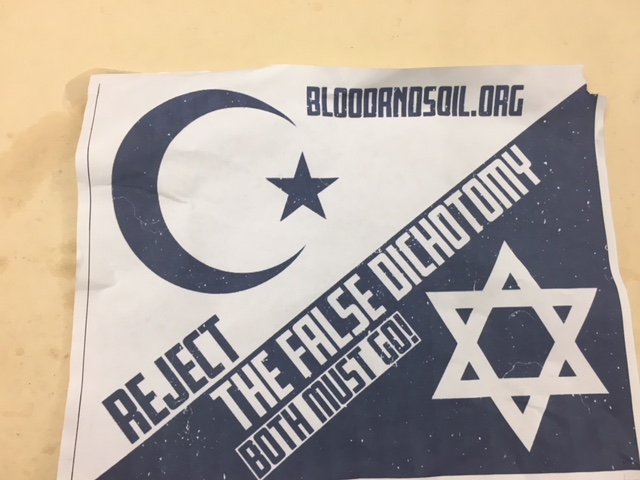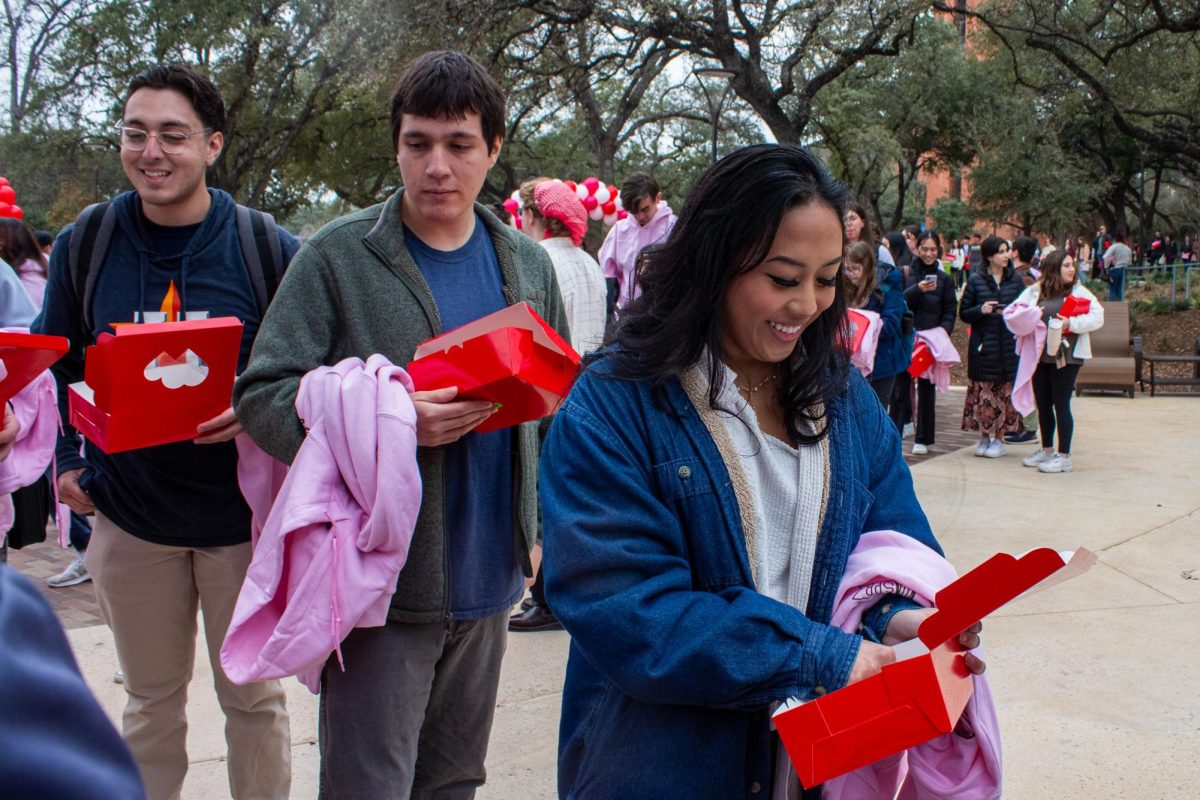Members of the Patriot Front, a self-described fascist organization, hung flyers bearing white nationalist messages around campus on Monday. One poster featured a map of the United States and the text “NOT STOLEN, CONQUERED”; another read “RESURRECTION THROUGH INSURRECTION.” All of the flyers included the URL for the website of the Patriot Front.
Roughly one dozen flyers were found and taken down. Soon after the administration was made aware of the flyers, university president Danny Anderson sent an email to all students, faculty and staff.
“We suspect, but have not confirmed, that this is the work of trespassers who have recently targeted area universities with similar messages in an effort to stoke conflict and division,” Anderson wrote in a campus-wide email. “Please join me in sending the strongest possible message that hate will not be countenanced at Trinity University. While freedom of expression is fundamental to an open and robust academic environment, acts of intimidation, discrimination and prejudice will not be tolerated.”
Members of the community have agreed that these messages are not an exercise of the right to free speech.“I think that they were advocating positions that were really against the university’s values,” said Sharon Jones Schweitzer, assistant vice president for university communications. “While we value freedom of speech and believe that a university is certainly the appropriate place for a variety of points of view to be expressed, there really is no room for speech that is sort of masquerading as free speech, that is racially motivated, religiously motivated or is basically hate speech.”
Schweitzer suspects these flyers are related to similar events that have happened on other campuses in San Antonio and across the country.
“College campuses have been kind of lightning rods for hate speech, marches that are anti-diversity as a community, and it just seems to kind of be a continuation of that,” Schweitzer said. “We can’t just think that because we’re in San Antonio, and we’re this idyllic, beautiful college campus, that we would be immune to that.”
Claudia Stokes, professor and chair of the English department, was one of the first people to notice the flyers. On the way to her Northrup office in, Stokes found a flyer that depicted the Muslim star and crescent and the Star of David with the words “REJECT THE FALSE DICHOTOMY. BOTH MUST GO!”
Stokes initially thought the flyer was advertising a sort of dialogue or discussion that was being held on campus.
“Then, I saw the website, ‘bloodandsoil.org,’ and I literally pivoted and turned around.” Stokes said. The phrase ‘Blood and Soil,’ used to invoke racial purity and national unity, was a 20th-century slogan used to promote Nazism in Germany. “I was incredulous to see this movement has set foot on our campus.”
Stokes, who is Jewish, says she is accustomed to public anti-Semitism. Stokes described how she immediately felt concerned for minority students, especially those who may not be accustomed to such a degree of discrimination.
“I’m not surprised by anti-Semitism. I see it all the time. It’s not a shock to me. I’m used to it,” Stokes said. “My response was primarily as a professor, and I was really dismayed to see this kind of hate speech on our campus. I was mostly concerned about the safety of our students — that was my first response.”
Emily Bourgeois, sophomore English major and co-president-elect of Trinity Progressives (T-Prog), echoed this concern for safety.
“I find it deeply disturbing. I think it’s terrifying that someone has used Nazi propaganda on our campus, especially in 2017. It doesn’t make me feel safe, and it doesn’t make me feel good. As a student I don’t feel super safe on this campus anymore,” Bourgeois said. “That being said, i know it probably didn’t come from someone on this campus.”
Sajida Jalalzai, assistant professor of religion, practices Islam and says she is familiar with hate speech and religious discrimination. However, Jalalzai recognizes that not all Trinity students have had similar experiences.
“I think in some ways, it’s nice that people are surprised because it means there is an expectation that something like this shouldn’t happen,” Jalalzai said. “On the other hand, I think that what happens after surprise is what’s meaningful, and hopefully that involves some sort of action.”
Despite whether community members have experienced such discrimination and expression of hatred before, the situation has caused many to question the boundaries of free speech.
“As a member of an educational institution, we need to value free speech. As an American, we need to value free speech, and legally it is permissible to have your opinion and to state your opinion, even if I disagree with it,” Jalalzai said. “That said, there are limits to free speech, and I think that, when you are either indirectly or directly, implicitly or explicitly threatening a person or making them feel particularly vulnerable on the basis of their race, their religion, their sexual identity, then I think those are situations where we need to consider the boundaries of free speech.”
Stokes sees the issue not as one concerning the limits of free speech, but rather one of civility.
“As a community, Trinity has the right to decide whether it tolerates this hateful rhetoric,” Stokes said. “I also think that we do a real disservice when we dignify the alt-right as a legitimate platform. They’re not conservatives, they’re not Republicans. They’re Nazis, and there’s no place for Nazis in American political life, and I think that we can’t treat these people like they’re a legitimate wing of a political movement. It’s not like they’re the extreme far right. They’re not. They’re Nazis.”
Bourgeois has dealt with this conflict of supporting freedom of speech by defining the difference between it and hate speech.
“Freedom of speech is really important to have a healthy democracy, but at the same time, it’s very difficult when you’re required to listen to the opinions of people who are saying things like this,” Bourgeois said. “There’s definitely a line between free speech and hate speech.”
Bourgeois explained that, though dialogue is one of the core tenets of democracy, this situation is not that.
“There’s a difference between sharing your opinions because they’re what personally affect you and sharing your opinions in a way that affects others and their quality of life,” Bourgeois said.
The situation has forced other student organizations, including conservative student group Tigers for Liberty (TFL), to think about other kinds of boundaries that come with free speech. Isaiah Mitchell, sophomore English major and TFL co-president, explained that the flyers and their removal have left TFL members conflicted, especially since a similar instance took place last year when flyers they had posted were taken down.
“We all agree that we don’t like them; we disagree with their ideology,” Mitchell said. “But it happened to us, so there is a certain amount of sympathy. We’re all about free speech, but we’re also about private property rights, and they infringed on that. Trinity University is a private organization; they have the right to take down whatever people put on their walls.”
Mitchell and other members of TFL have also found themselves conflicted about whether the posters should be taken down since they are an exercise of free speech.
“The two main camps in our group are [to either] keep them up in respect of free speech and, my own personal belief, that we should be united against these kinds of people,” Mitchell said. “We shouldn’t diminish their free speech, but I don’t think they had a right to just put up posters without permission.”
Though Mitchell thinks the campus should unite against the people who posted the flyers, he doesn’t see a unification of TFL and T-Prog in the resolution. Mitchell believes such a union wouldn’t work due to the two groups’ differing values.
“There are certain ideological obstructions,” Mitchell said. “I like the idea of more cultural unity and having disagreement under an umbrella of being Trinity Tigers, or Americans or what have you, but there are certain ideological boundaries to what we can do with T-Prog. We do try to have as many of those outreaches as possible.”
Bourgeois disagrees. She believes that the two groups should stand together against the white nationalist movement to protect Trinity’s political climate and to express the university’s condemnation of such discrimination.
“I think it’s going to require collaboration with Tigers for Liberty because we agree, even though we’re on two very opposite sides of the political spectrum,” Bourgeois said. “Both of these political student organizations agree that this is not how political activism on Trinity’s campus is going to be.”
Stokes believes it is this kind of political activism and awareness that make colleges a threat to neo-Nazism.
“They’re really hostile toward critical thinking. They’re really hostile and very suspicious toward historical thinking. They’re hostile toward reasoned facts,” Stokes said. “I think that a university is a site of ethical intellectual debate, and reasoned ethical debate is intrinsically incompatible with Nazis. So I think that higher education is a threat to the alt-right.”
Later that day, Nick Santulli, sitting president of the Student Government Association (SGA), sent a campus-wide email paralleling Anderson’s, in which he expressed support for the students targeted by Patriot Front’s messaging.
“This incident, while troubling, reminds us to defend the values we all hold dear,” Santulli wrote. “Moreover, as young people and students, we should remember our ability to affect positive change in the world around us. In uniting against hate, let us also reaffirm our commitment to building a brighter and more just future.”
T-Prog will be hosting a dialogue on the subject on Friday, Dec. 8 at 6 p.m. in the Woodlawn Room in Coates University Center. Anderson has asked that community members notify Trinity University Police Department if any more flyers are found.













